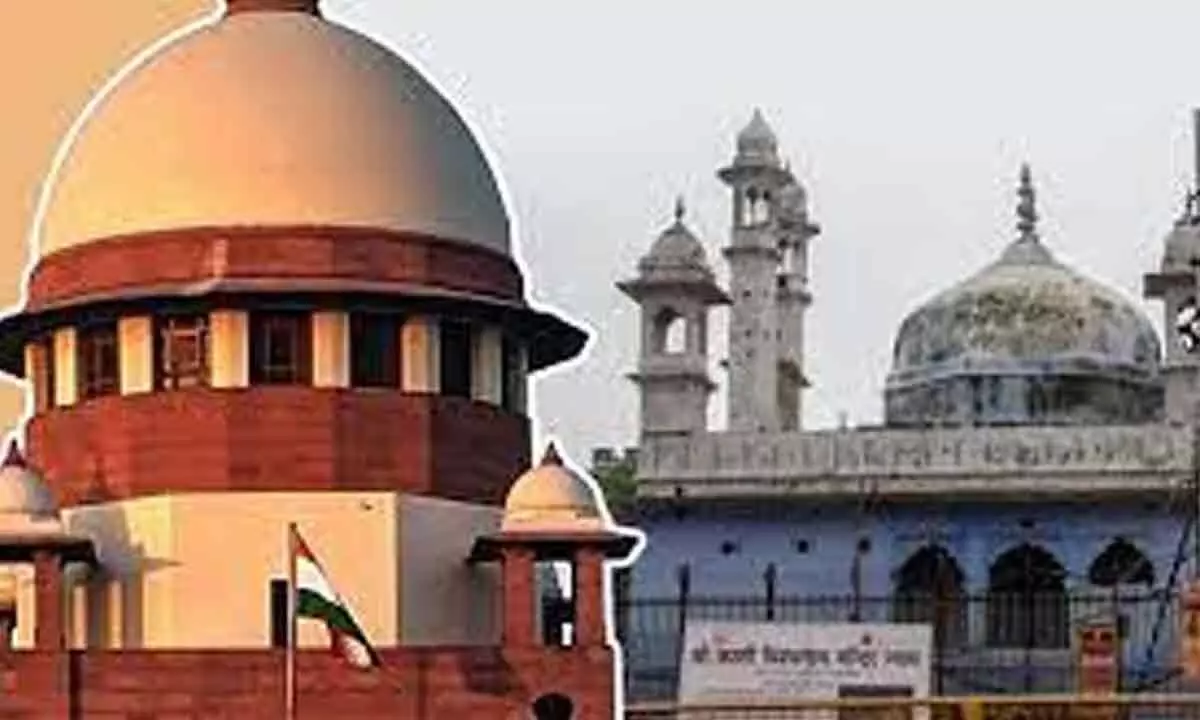Adjudicate on religious matters carefully

In the old city of Jerusalem, there lies a 187-foot long ‘Western Wall,’ built by Herod on the western flank of the Temple Mount.
In the old city of Jerusalem, there lies a 187-foot long 'Western Wall,' built by Herod on the western flank of the Temple Mount. Whilst the wall was considered Muslim property as an integral part of the Haram esh-Sharif and waqf property, the right of Jews to prayer and pilgrimage co-existed.
The ;Western Wall' has been fraught with severe skirmishes between communities and though the Western Wall is carved in stone, the fate of its worshippers is not, and is writ with an unease that has come to be seen largely in religiously zealous places such as in India.
The present dispute pertains to the land where Gyanvapi mosque is situated in Varanasi and has been witness to several proceedings in courts since 1991. In 1991, a suit was filed by the devotees of the Kashi Vishwanath temple near which the Gyanvapi mosque is situated, alleging that the mosque was built after a Lord Vishweshwar's temple was destroyed by Mughal emperor Aurangzeb.
The proceedings in the 1991 suit have been stayed by the Allahabad High Court. When a litigation has been decided and kept in abeyance all consequential suits arising out of the same cause of action should be brought to a halt and decided in accordance with the earlier pending litigation in order to avoid multiplicity of proceedings
However, recently another suit was filed in 2021 by female devotees and worshippers of Lord Shiva, practising the Vedic Sanatan Hindu dharma before Civil Senior Judge, Varanasi, seeking "restoration of performance of rituals at principal seat of an ancient temple" at the Gyanvapi mosque area".
The dispute has now reached the apex court after multiple orders having been passed by both the civil court in Varanasi and the Allahabad High Court since 1991 on pleas by both the Hindi devotees and Anjuman Intezamia Masjid Varanasi, the Masjid Committee and others.
The Varanasi court had ordered an inspection of the premises on petitions moved by five Hindu women asking for year-long access to pray at a Hindu shrine behind the western wall of the Gyanvapi mosque complex in Varanasi, which is currently open for prayers once a year.
Be that as it may, the Anjuman Intezamia Masjid Varanasi, has sought leave of the Supreme Court that its application under Order 7 Rule 11 should be heard first by the civil judge, and then only should the case be proceeded with, including the unfolding of the commission's findings. To countenance the same, the plaintiffs have stated that to address the very cause of action in the case it is imperative that the commission's reports be attended to at first.
This has indeed led to a legal quagmire, and more in particular, encompassing the civil body of law, in the instant case. But the Supreme Court on May 20, 2022 put it to rest and has ordered that the application filed by the Committee of Management Anjuman Intezamia Masjid under Order 7 Rule 11 CPC for rejection of the suit as being barred in law, shall be decided on priority by the district judge. So, the question therefore is whether the Gyanvapi mosque does conceal in its premises a "Shiv Ling" as alleged by the plaintiffs or for that matter can the civil court in view of the estoppel envisaged by the Places of Worship Act, 1991, view the matter at all.
The significance of the Places of Worship Act, 1991, cannot be undermined. A legislature that has been in the fore in preserving the secular fabric of our nation has been the Places of Worship Act, 1991, which only accommodates the Babri Masjid case as an exception to its covenant. The Act itself which is under challenge before the apex court is the torch-bearer of the secular ethos of our Constitution.
The constitutional bench of the Supreme Court in the Babri masjid title suit, while observing on the importance of the Places of Worship Act, 1991, stated that "The Places of Worship Act imposes a non-derogable obligation towards enforcing our commitment to secularism under the Indian Constitution."
What is worrisome is that matters of religious fervour are being adjudicated liberally in courts of law, where forensics ought to have been the rational way forward. The question, therefore, that is now posed for our understanding is whether the plaintiffs' prayer for the restoration of the performance of rituals at the principal seat of an ancient temple in the Gyanvapi mosque holds any water, and whether the courts are competent to tread these holy waters keeping in mind that only recently have they come out of the troubled waters of the Babri Masjid-Ram Janmabhoomi case.
(Adeel Ahmed is an
advocate-on-record in the
Supreme Court of India. The
views expressed are personal)

